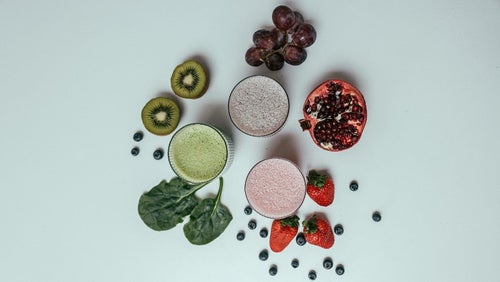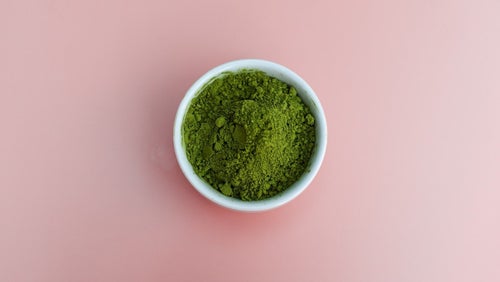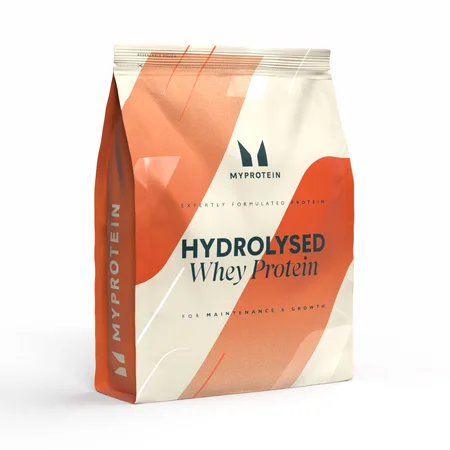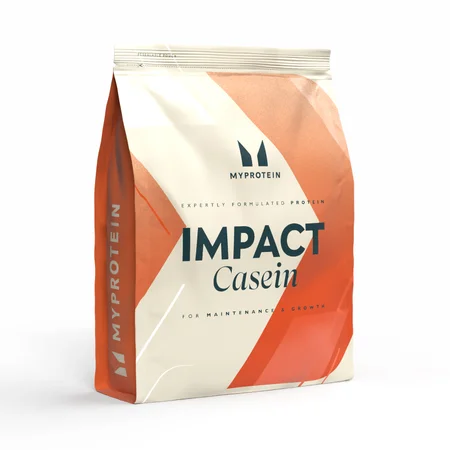Casein Vs. Whey Protein | What’s The Difference?

Want to get more from your training and recovery time? This is where many people look for a convenient protein source to get them started. Supplementing your diet with protein can be a great way to help you achieve the results you want. The question is, which protein is better to consume to help reach your goals – whey or casein?
Two of the most popular proteins available are whey and casein. They’re both high-quality complete proteins rich in branched-chain amino acids (BCAAs) making them a great tool for muscle growth and repair.1
- What is whey?
- What is casein?
- What's the difference between casein and whey?
- When should you take whey vs. casein?
- What are the benefits of casein
- Casein foods list
- How and when should I take casein?
- What are the side effects of casein?
- Casein Recipes
What is whey?
Whey is a high-quality source of protein found in cow’s milk and it can be processed in various ways to produce three main forms of whey:
The difference between each variation is mainly the level of fat and carbohydrates. Concentrate tends to have slightly less protein and more fats and carbs, while isolate and hydrolysate are more processed to get a higher level of protein and lower levels of carbs and fat. Whey is much higher in leucine content than casein protein. Leucine is one of the most beneficial BCAAs required for muscle growth and recovery. As a result, taking whey after a workout can help in preventing excessive muscle breakdown and in promoting muscle synthesis.1
Whey protein is commonly found in powder form and comes in more flavours than you could ever think of, such as sticky toffee pudding and salted caramel. It is a multi-use supplement meaning it can be used as a shake with water or milk or added into foods such as porridge or bakes.
What is casein?
Casein protein is also found in cow’s milk too and contains all the essential amino acids. It’s more slowly digested than whey resulting in a slower, more prolonged release of amino acids. This makes it a very beneficial supplement to take especially during prolonged periods of fasting or before you to go sleep.1,2,3,4,5
It’s also widely available, usually in powder form and can be taken as a quick shake usually with milk or water. It can also be a good addition to some Greek yoghurt, which is a great source of casein too.
What's the difference between casein and whey?
Casein and whey are both proteins that are found in milk. Casein actually makes up 80% of the protein in milk, while whey makes up the other 20%. They’re both complete proteins, meaning they contain all the essential amino acids that the body can’t make itself. The main difference between both is the rate of digestion — casein takes longer to digest. It has a slow absorption rate in the gut which means that it slowly provides your cells with small amounts of amino acids over a long time. Both proteins are rich in amino acids, but whey is considered better for muscle building whereas casein is useful to prevent muscle breakdown.
Using both proteins in combination with each other at different times of the day can help boost better muscle growth and prevent muscle breakdown.

When should you take whey vs. casein?
To achieve optimum muscle growth and recovery, take both supplements in combination at different times of the day. Supplementing whey protein before or during your workout helps to fuel your muscles quickly due to its rapid-digesting nature.
On the other hand, if you’re looking to prevent muscle breakdown during periods of prolonged fasting — especially overnight — casein is your best friend. Supplementing with casein can also be beneficial in holding off hunger as protein often makes you feel fuller for longer, helping to reduce your food intake and in promoting weight loss.

Benefits Of Protein Shakes Before Bed
It's time to switch up your midnight snack.
One study found whey protein to increase protein synthesis by nearly two thirds, but it had no effect on muscle protein breakdown. On the other hand, Casein decreased protein degradation by one third and it didn’t affect protein synthesis.6 This may be a reason to use both in your daily routine to preserve and build muscle.
In addition to this, another study found no difference in muscle protein synthesis despite different patterns of blood amino acid response.7 This concludes that the most important thing overall is to ensure you are getting enough protein in your diet overall. Good lean sources of protein in your diet includes chicken, turkey, fish, meat-free alternatives, dairy and pulses.
What are the benefits of casein
1. Slow digesting
The body’s slow digestion of casein protein is the primary reason it can be a beneficial addition to your diet. It offers all the benefits of protein but can work for a longer period, even hours after you take it. You can think of it as a slower, but more constant, stream of amino acid building blocks.

Amino Acids: Benefits & Best Supplements To Take
Nutritionist answers all your amino acids questions.
2. Muscle building - strength & recovery
The action of casein is beneficial to both building muscle strength and enhancing recovery. Because we know that our muscles benefit from extra protein for up to 24 hours after our workout, casein is the perfect way to continue to feed the muscles long after a meal.8
Exercise causes small tears in our muscles and protein helps to repair those tears and build them back up, stronger than before. The specific amino acids found in casein, including the BCAAs or branched chain amino acids, are excellent for decreasing soreness and helping to speed recovery.
3. Fat loss
Casein is a calorie-dense source of protein, with very little fat or carbohydrates, making it a very pure protein. Protein slows the digestive process, which makes your body feel fuller for longer.
Protein has been shown to increase satiety and help decrease calorie intake, which can lead to fat loss while preserving muscle. The greater your muscle mass, the higher your metabolism will be — also helping to burn more calories and fat.
4. Bone & Teeth Health
Because casein is a protein made from milk, it also happens to contain calcium and phosphorus, two essential minerals for our bone and teeth health. Our bones and teeth depend on calcium to stay strong, especially as we age, and using casein gets the benefit of dairy products without any added sugar.
5. Overnight protein source
Since most of us aren’t waking up in the middle of the night to eat to fuel our muscles, casein is a unique way to fuel our muscles even while we sleep. While a whey protein supplement is great immediately after a workout, it absorbs quickly.
Casein, with its slower absorption, gives the benefit of long-lasting protein supply to our muscles, even while we are in bed sleeping.

Casein foods list
Milk is made up of 80% casein, so dairy products are all naturally high in casein. If using milk as a source of casein, choose non-fat and non-flavoured skim to avoid extra carbs and fat.
Butter and cheese are good sources of casein but are high in calories from fat, so it’s best to eat these in moderation (tough, we know).
Yoghurt and puddings made with milk naturally contain casein. You can even use casein powder to make some delicious desserts.
Cottage cheese is an excellent source of casein when you buy the low or no-fat version. It’s great on toast, or with fruit — some even like it straight from the pot.

How and when should I take casein?
Casein can be taken any time of day, with or without other foods. If you want to maximise the benefit of casein in your diet, take it before bed or during another long period between meals when you want to continue to fuel your muscles even if you are not eating.
There’s no harm in adding casein to your post-workout shake for convenience, as your muscles will benefit from the slow digestion and absorption any time of day.

What are the side effects of casein?
Because casein is the primary protein found in milk, those who have a milk allergy or sensitivity are most likely allergic or sensitive to casein and should avoid it as a supplement.
Large doses may cause gastrointestinal discomfort or indigestion, but overall has a low risk of side effects for those who have no trouble consuming dairy products.
Casein Recipes
Casein Cookie Dough
Ingredients
- 1 scoop Slow-Release Casein
- 15g Crunchy Peanut Butter
- 20g Cacao Buttons
- 100ml milk
Instructions
- Mix all the ingredients together by hand or in a food processor to form a dough-like consistency. (If you use a food processor, do not add in the cacao nibs until the end when you have removed the mixture from the processor, this is to ensure you have ‘chocolate chips’ in your cookie dough.)
- Enjoy straight away or leave in the fridge.

Casein Bedtime Shake
Ingredients
- 100g banana
- 1 scoop of Slow Release Casein.
- 350g yoghurt
- Ice cubes
Instructions
- Blend all the ingredients together.
- Pour into a glass with ice and enjoy.

Take home message
Both whey and casein are two beneficial proteins that can be supplemented into your diet to promote muscle growth and repair. The main variation between both proteins is the time it takes to be digested and absorbed.
Whey protein is recommended to those of you who wish to maximise muscle growth after a workout because of it being rapidly digested and absorbed. If you wish to increase muscle growth but prevent protein breakdown during prolonged periods of fasting, then casein is better.
FIND MORE HERE:

What Is Inositol? | Benefits & Side Effects
Why this supplement should be at the top of your list.

7 Health Benefits Of Green Tea
Reduce inflammation, decrease body fat, improve blood flow and loads more.

- Phillips, M. (2014). A brief review of critical processes in exercise-induced muscular hypertrophy. Sports Medicine. 44(1). 71-77.
- Madzima, T., Melanson, J., Black, J., & Nepocatych, S. (2018). Pre-Sleep Consumption of Casein and Whey Protein: Effects on Morning Metabolism and Resistance Exercise Performance in Active Women. Nutrients, 10(9), 1273. doi: 10.3390/nu10091273
- Trommelen, J., & van Loon, L. (2016). Pre-Sleep Protein Ingestion to Improve the Skeletal Muscle Adaptive Response to Exercise Training. Nutrients, 8(12), 763. doi: 10.3390/nu8120763
- Devries, M., & Phillips, S. (2015). Supplemental Protein in Support of Muscle Mass and Health: Advantage Whey. Journal Of Food Science, 80(S1), A8-A15. doi: 10.1111/1750-3841.12802
- Ribeiro, A., Nunes, J., Schoenfeld, B., Aguiar, A., & Cyrino, E. (2019). Effects of Different Dietary Energy Intake Following Resistance Training on Muscle Mass and Body Fat in Bodybuilders: A Pilot Study. Journal Of Human Kinetics, 70(1), 125-134. doi: 10.2478/hukin-2019-0038.
- Dangin, M., Boirie, Y., Garcia-Rodenas, C., Gachon, P., Fauquant, J., Callier, P., … & Beaufrère, B. (2001). The digestion rate of protein is an independent regulating factor of postprandial protein retention. American Journal of Physiology-Endocrinology And Metabolism, 280(2), E340-E348.
- Tipton, K. D., Elliott, T. A., Cree, M. G., Wolf, S. E., Sanford, A. P., & Wolfe, R. R. (2004). Ingestion of casein and whey proteins result in muscle anabolism after resistance exercise. Medicine & Science in Sports & Exercise, 36(12), 2073-2081.
- Jäger, R., Kerksick, C. M., Campbell, B. I., Cribb, P. J., Wells, S. D., Skwiat, T. M., … & Smith-Ryan, A. E. (2017). International society of sports nutrition position stand: protein and exercise. Journal of the International Society of Sports Nutrition, 14(1), 1-25.













